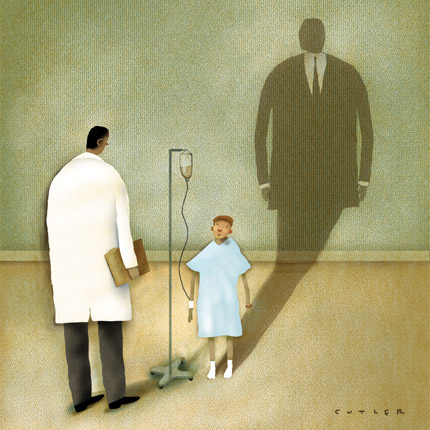September 2010

History is key after childhood disease
A generation ago, most children with severe disabilities died before reaching adulthood. Now, more than 90% survive. From cancer or congenital heart disease to cystic fibrosis and Down syndrome, pediatric survivors need interns who can coordinate chronic care.
Should doctors worry about online ratings?
Consumers have free rein to anonymously post negative comments online about their physicians. Some are fighting back, while others learn how to turn potentially negative posting into a positive promotional tool for their practices.
Targeting rural health scholars keeps doctors in Kansas
Small-town practice has appeal to physicians who were born and raised in such communities. The Scholars in Rural Health program seeks to expose medical students to underserved areas, nurture a desire to practice primary care and offer incentives such as loan forgiveness.
Cuba is just across the water, but medically, a different world
ACP Member Paul Drain explored Cuba's medical system and finds primary care broken down much differently than in the U.S., with more access resulting in less of a need for inpatient care. But the politics of re-establishing relations with the country are no less tenuous today than they've previously been.
Rhode Island practice adopts patient-centered medical home
A patient-centered medical home model lets one physician focus on a proactive, holistic approach of preventive care. The reward was recognition from the National Committee for Quality Assurance.
Leflunomide gets boxed warning, ARBs under review
Recalls, warnings, approvals and other regulatory news.
Childhood disease survivors need comprehensive care
A look at how internists can manage a rising population of patients who, while currently well, might need lifelong follow-up.
Letters to the Editor
Reader comments on the role of ancillary services in an internal medicine practice, and on the need for attention to nutrition and lifestyle in caring for rheumatoid arthritis.
Expectations exceed understanding in unraveling the genome
Genomic advances have come at a tremendous pace, yet frustration exists that the benefits are not available today. Members of the medical community debate where to focus resources to balance long-term goals against pressing needs.
EHRs could solve resource overuse, free up physician time
Electronic health records can help physicians with the administrative burdens of practice, allowing them to focus on the clinical aspects of caring for patients.
Monday morning quarterbacking doesn't score touchdowns
The “failure” to permanently reform the sustainable growth rate formula shouldn't jeopardize overall progress on health care reform.
Claims coding edits target improper payments, errors
Knowing the ins and outs of claims coding edits speeds reimbursement, but they are tricky even for experienced office staffers. Learn how to do them properly, and what resources exist to help.
Easy ways to ensure meaningful use
Preparing, selecting and fully implementing an electronic health record require time and money at a time when there's not a lot of either. Six easy steps can prepare staff to meet the core sets of objectives and measures.
MKSAP Quiz: new-onset atrial fibrillation
A 30-year-old woman is evaluated for management of new-onset atrial fibrillation. She has a history of tetralogy of Fallot that was repaired at age 18 months. She has had no cardiovascular concerns since then and has not had regular follow-up since childhood. What is the most likely cause of this patient's atrial fibrillation?.
